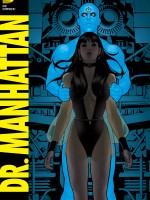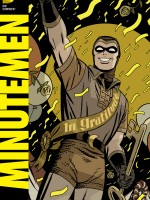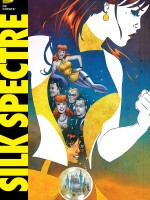Contemplating “Before Watchmen”
Before Watchmen: possibly the two most polarizing words in the comic book community right now (Grant Morrison is a close second.)
Mixed emotions battle between the legitimacies and necessities of this controversial series. As much dust that was kicked up over the film, this move by DC has been even more scrutinized by “experts” within the culture. Just 4 issues in, Before Watchmen has proven that there are certainly intriguing aspects to these characters, but is this something we didn’t already know? Have we really sold our souls, or have we just gotten a few more drops from a cash cow?
Throughout “Watchmen” there is an expansive use of symbolism to help express some of the underlying themes Watchmen touches on. The clock, in particular becomes this looming doomsday clock as time tics closer and closer to destruction. To a further extent, this cyclical movement is used to explore thought processes of the characters. Dr. Manhattan is closely tied to a very specific watch, and as he becomes this Godly embodiment of pure power, he exists throughout time and space, as a subject to neither but incapable of escaping either.
Given this perspective the circular image plays an even greater role in the understanding of Watchmen as a commentary on comic’s culture. This experimental and highly effective idea is commonplace in Watchmen, one of the many aspects that has projected it so far beyond other similar titles.
This is what seems to be missing from “Before Watchmen”. A unified vision that can be expressed uninterrupted over the course of 12 chapters. Instead, the separate books while individually are interesting seem to lack any overarching narrative, or anything that adds weight to these independent tales. Granted we are still only a single issue in, and this feeling could very-well change, as of now there is more to be desired. Is this what was expected though? Is that the reason so many people bit down and called foul?
Alan Moore’s original “Watchmen” was, is, and will always be regarded as a monumental achievement for comics and graphic novels. Regardless of how many times Watchmen is expanded, translated or rebooted, this will not change. So why has there been so much resistance put up against Before Watchmen?
It seems as though some of us feel compelled to find allegiance with the legendary Moore. But I can’t help but wonder why such commitment to just him. Certainly Moore has earned his keep through his work, but hasn’t Frank Miller? A guy who people couldn’t wait to lambast as soon as The Spirit and Holy Terror came out, or what about Neal Adams with Batman: Odyssey? These two have absolutely earned their ranks in the hall of fame but as soon as they put out something less than stellar we all can’t wait to jump ship.
Sure they weren’t exactly good, but the amount of rage we saw spewed at these people on the Internet and at conventions was startling. Their peak days may now be behind them, but that’s no reason to raise arms against these creators.
Is it the characters that we become invested in, and therefore their best interests we want to see cared for? If this were the case than we should have been concerned with Watchmen adapting its protagonists from the deceased “Charlton Comics” who housed characters bearing striking resemblances to Watchmen’s heroes and villains. In any industry successes will often be utilized.
I’m not suggesting that this is ethical, but rather that it seems to be inevitable.
It remains just as true today as it did then, as Before Watchmen is recycling old ideas and making them new. Perhaps this is simply how this industry must function. New ideas replacing old ideas that are meant to fit the parameters of a certain time space. The serialized comics often get flack for never truly progressing. Characters who die will often return before long to ensure readership more than anything.
The successes of these characters are duly noted by publishers and are often used only to increase profit. It seems as though only the standalone graphic novels can escape this unfortunate conundrum. Recently learning of Moore’s slight variations to “Charlton Comics” heroes left me questioning Moore’s validity in his sentiment towards Before Watchmen and the film adaptation.
There are certainly legitimate qualms that should have been addressed by DC, but does that warrant the lambasting we curious readers experienced. I’ll leave a quote from Mr. Moore on his opinions about all of us who read these books, be it out of interest or affinity.
“I have to say that if you are a reader that just wanted your favorite characters on tap forever, and never cared about the creators, then actually you’re probably not the kind of reader that I was looking for. I have a huge respect for my audience. On the occasions when I meet them, they seem, I like to think, to be intelligent and scrupulous people.
If people do want to go out and buy these Watchmen prequels, they would be doing me an enormous favor if they would just stop buying my other books. When I think of my audience, I like to have good thoughts and think about how lucky I am to have one that is as intelligent as mine and as moral as mine. […] The kind of readers who are prepared to turn a blind eye when the people who create their favorite reading material, their favorite characters, are marginalized or put to the wall — that’s not the kind of readers I want.
So, even if it means a huge drop in sales upon my other work, I would prefer it that way. I mean, there’s no way I can police this, of course. But, I would hope that you wouldn’t want to buy a book knowing that its author actually had complete contempt for you. So, I’m hoping that will be enough.”-Alan Moore




